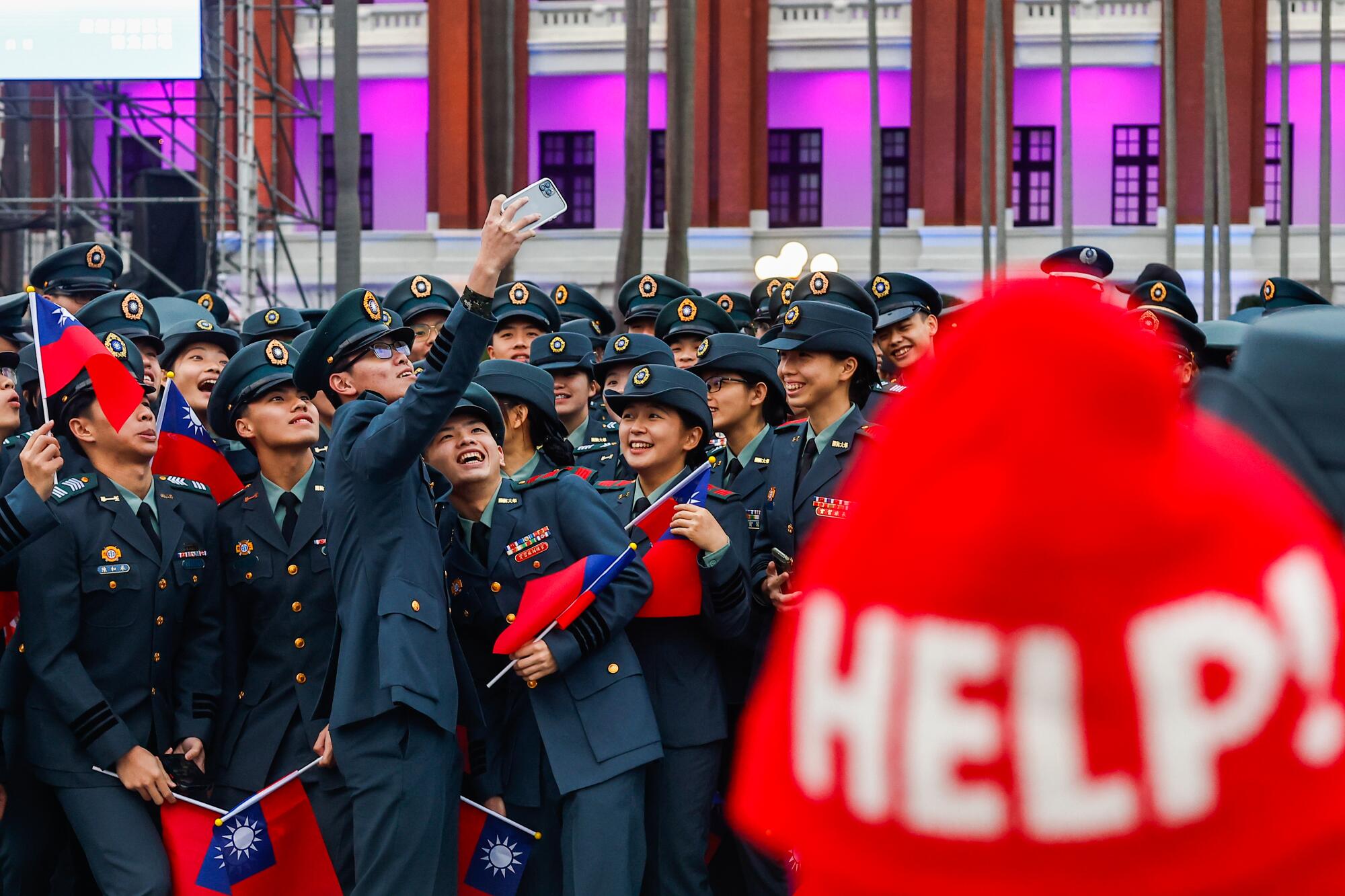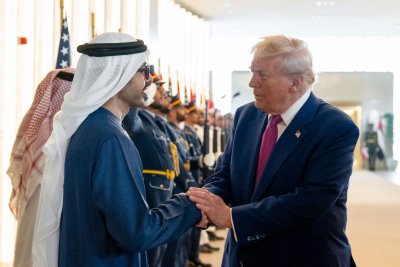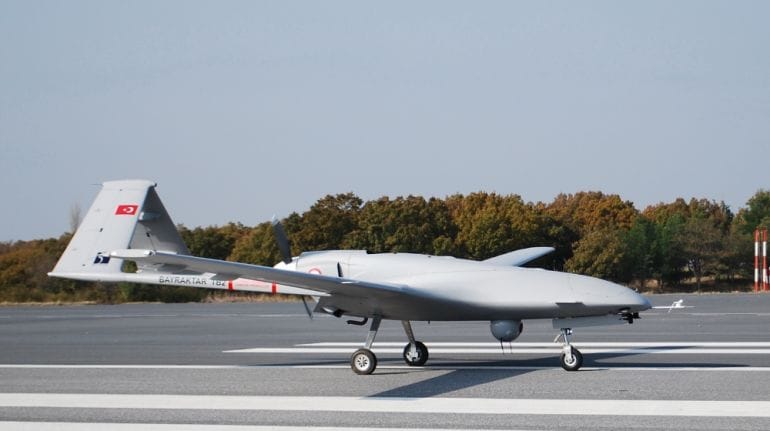Justice Dept. ratchets up threats over trans athletes in California
The U.S. Justice Department ratcheted up its efforts to block transgender athletes from competing in school sports in California by warning school districts Monday that they will face legal trouble if they don’t break from the state and bar such athletes from competition within days.
The new warning followed similar threats by the Trump administration to the state and the California Interscholastic Federation, which governs youth sports and requires transgender athletes be allowed to compete. It also comes after AB Hernandez, a 16-year-old transgender junior from Jurupa Valley High School, won multiple medals at the state high school track and field championships on Saturday, despite a directive from President Trump that she not be allowed to compete.
Assistant Atty. Gen. Harmeet Dhillon — a conservative California lawyer who focused on challenging LGBTQ+-friendly state laws before being appointed by Trump to head the Justice Department’s Civil Rights Division — wrote in a Monday letter to school districts that continuing to comply with CIF rules allowing transgender athletes to compete “would deprive girls of athletic opportunities and benefits based solely on their biological sex,” in violation of the U.S. Constitution.
To “avoid legal liability” for such violations, Dhillon wrote, each district must “certify in writing” by June 9 that it is no longer complying with the federation’s rules and barring transgender athletes from competition.
Dhillon said on the social media platform X that her office put “1600+ California schools on blast for violating equal protection in girls’ sports.”
Dhillon’s letter made no mention of the CIF’s rule change last week — after Trump threatened to revoke federal funding from California if Hernandez competed in the state championships. The change allowed any cisgender girl bumped from qualifying for event finals by a transgender athlete to compete anyway. It also ensured cisgender girls were awarded medals in every race, regardless of how Hernandez placed.
The policy was intended as a compromise, but it drew little support from those on the conservative right demanding a full ban on transgender athletes.
In addition to Trump’s funding threat, Dhillon’s office last week announced it was launching an investigation into the state, the interscholastic federation and the Jurupa Unified School District, where Hernandez competes.
A spokesperson for California Atty. Gen. Rob Bonta’s office said officials there were “very concerned with the Trump Administration’s ongoing threats to California schools and remain committed to defending and upholding California laws and all additional laws which ensure the rights of students — including transgender students — to be free from discrimination and harassment.”
The office was “reviewing the letter and closely monitoring the Trump Administration’s actions in this space,” the spokesperson said.
Elizabeth Sanders, a spokesperson for the California Department of Education, said the agency had no comment on Dhillon’s letter Monday but was “preparing to send guidance” out to districts Tuesday. She said California Supt. of Public Instruction Tony Thurmond also had no response Monday.
The Los Angeles Unified School District declined to comment. Other local districts around L.A. did not respond to requests for comment.
LGBTQ+ advocates criticized Dhillon’s letter, calling it the latest proof that the Trump administration is not actually concerned with protecting cisgender athletes but with targeting transgender kids to score political points.
Shannon Minter, vice president of legal at the National Center for Lesbian Rights, helped draft the interscholastic federation’s original rules allowing transgender athletes to compete, and also supports the new rule — which he said ensures that both transgender and cisgender athletes get to compete.
At last weekend’s meet, for example, Hernandez’s competing did not push any cisgender girls out of competition.
Hernandez took gold in both the girls’ triple jump and girls’ high jump, and placed second in the girls’ long jump — but wasn’t alone in any of those spots.
For the triple jump, she stood on the podium alongside a cisgender girl who was also given gold. For the high jump, she shared the podium with two cisgender girls with whom she tied. For the long jump, she shared the second-place podium spot with a cisgender girl who also was awarded silver.
The new rule addressed “the concerns people had about taking opportunities away from non-transgender girls, and it makes sure that cannot happen — it literally eliminates that concern altogether,” Minter said.
By ignoring the new rules, he said, Dhillon’s letter “shows what we already knew, which is that this administration isn’t concerned at all about protecting athletic opportunities for girls, this is just about bias against transgender people — pure and simple.”
Critics of transgender youth participating in sports, meanwhile, cheered Dhillon’s letter as a major victory.
Sophia Lorey, outreach director for the conservative California Family Council, said it was “huge.” Lorey was kicked out of the state championships Saturday after handing out fliers urging people to sign a petition calling on the interscholastic federation to change its policies.
“Here we gooooo!” Lorey wrote on X. “As a born & raised Californian who played soccer through college — I am beyond grateful.”
At least a handful of California school districts with conservative elected leaders would be eager to comply with the new directive.
On April 17, the Chino Valley Unified school board unanimously approved a resolution titled “Supporting Title IX and Fairness in Girls’ Interscholastic Sports.” The resolution stated that “biological differences between male and female athletes can create inherent advantage in competitive sports, particularly in categories designated specifically for girls.”
The school system called on state governing bodies to uphold protections for girls in sports under Title IX, a 1972 federal civil rights law prohibiting sex discrimination in educational programs and activities that receive federal funding.
In April, the school system also filed a Title IX complaint with the federal Justice Department against Gov. Gavin Newsom, the California Department of Education, Thurmond and the California Interscholastic Federation.
The complaint said Chino Valley was “now caught between conflicting state and federal directives” and was requesting “urgent federal intervention.”
Sonja Shaw, president of the Chino Valley Unified school board, wrote on X that Dhillon’s letter was “a historic win” for parents, their daughters, the nation and “truth.”
“We will not bend. We will not compromise. We will protect our daughters at all costs,” wrote Shaw, who is running for state superintendent of public instruction. “The tide is turning. The silence is broken. And we are just getting started.”
Shaw also suggested that the support from the Trump administration could encourage her school system to take more aggressive action.
“I’m bringing this matter forward at our next board meeting,” Shaw said. “We will not comply with insanity. We will not be bullied into silence. We will not betray our girls to please radicals.”
Hernandez’s mother, Nereyda Hernandez, could not be reached Monday, but has previously said that it was heartbreaking to see her child being attacked “simply for being who they are,” and despite following all California laws and policies for competing.
She begged Trump to reconsider his efforts to oust transgender girls from sports.
“My child is a transgender student-athlete, a hardworking, disciplined, and passionate young person who just wants to play sports, continue to build friendships, and grow into their fullest potential like any other child,” she said.






